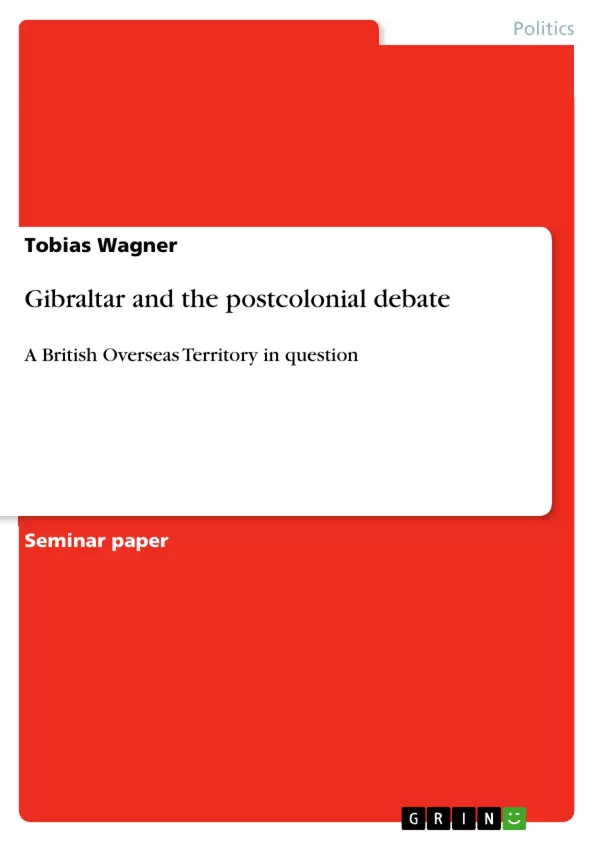This academic work focuses on Gibraltar as an example for the postcolonial debate. The British Overseas Territory in the South of the Iberian peninsula is held by Britain and claimed by Spain, which often led and leads to dispute between these two countries. This conflict is a good example for the debate about postcolonialism, since the work shows that the matter can't simply be put in the terms black and white.
Inhaltsverzeichnis (Table of Contents)
- Introduction
- The concept of postcolonialism
- Colonialism and its connection to imperialism
- (The problems of) defining postcolonialism
- A contested term
- The Gibraltar dispute
- The British Empire as a primary example of colonialism
- Gibraltar's colonial history
- British rule in Gibraltar today
- Conclusion
Zielsetzung und Themenschwerpunkte (Objectives and Key Themes)
This paper aims to provide an overview of postcolonial theory and apply its approach to the ongoing conflict surrounding Gibraltar. It begins by defining colonialism and exploring the complexities and varied interpretations of postcolonialism. The paper then analyzes the Gibraltar dispute within this theoretical framework.
- The definition and complexities of postcolonialism
- The historical context of colonialism and imperialism
- The application of postcolonial theory to the Gibraltar dispute
- The ongoing impact of colonialism on geopolitical relations
- The contested nature of territorial claims and sovereignty
Zusammenfassung der Kapitel (Chapter Summaries)
Introduction: This chapter sets the stage by discussing the Brexit referendum and its impact on the Gibraltar dispute. It highlights the long-standing claim by Spain over Gibraltar, ceded to Great Britain in 1713, and how Brexit has renewed this conflict, drawing attention to the broader issue of postcolonialism and territories still under foreign rule. The chapter introduces the paper's objective: to analyze the Gibraltar dispute through the lens of postcolonial theory.
The concept of postcolonialism: This chapter delves into the multifaceted concept of postcolonialism, starting with a definition of colonialism. It explores various scholarly perspectives on colonialism, highlighting its economic exploitation and political control. The chapter then tackles the complexities of defining postcolonialism, emphasizing the lack of a singular, universally accepted definition and the diverse interpretations within the field. It showcases various scholars' attempts to define postcolonialism, noting the significant heterogeneity within its theoretical framework and its ongoing relevance to understanding the lasting impacts of imperial power.
The Gibraltar dispute: This chapter applies the concepts discussed in the previous chapter to the specific case of Gibraltar. It examines Gibraltar's colonial history, the nature of British rule, and Spain's ongoing claim. The chapter likely explores the geopolitical implications of the dispute in the context of Brexit and the wider postcolonial discourse, analyzing how the dispute illustrates enduring power imbalances and the lasting legacies of colonialism.
Schlüsselwörter (Keywords)
Postcolonialism, colonialism, imperialism, Gibraltar, Brexit, British Overseas Territories, Spain, sovereignty, decolonization, neocolonialism, critical theory.
Frequently asked questions
What is the purpose of this document?
This document provides a comprehensive language preview including the title, table of contents, objectives and key themes, chapter summaries, and keywords for an academic paper.
What is the main focus of the paper?
The paper aims to provide an overview of postcolonial theory and apply it to the ongoing conflict surrounding Gibraltar.
What key themes are explored in the paper?
The key themes include: the definition and complexities of postcolonialism, the historical context of colonialism and imperialism, the application of postcolonial theory to the Gibraltar dispute, the ongoing impact of colonialism on geopolitical relations, and the contested nature of territorial claims and sovereignty.
How does the paper define colonialism and postcolonialism?
The paper defines colonialism and explores various scholarly perspectives on it, highlighting economic exploitation and political control. It then addresses the complexities of defining postcolonialism, emphasizing the lack of a universally accepted definition and the diverse interpretations within the field.
What is the significance of the Gibraltar dispute in the context of this paper?
The Gibraltar dispute serves as a case study to apply postcolonial theory. The paper examines Gibraltar's colonial history, the nature of British rule, and Spain's ongoing claim in the context of Brexit and the wider postcolonial discourse.
What are the key topics covered in the individual chapters?
The Introduction discusses the Brexit referendum and its impact on the Gibraltar dispute. Chapter 2 delves into the multifaceted concept of postcolonialism. Chapter 3 applies postcolonial concepts to the Gibraltar dispute.
What are the keywords associated with this paper?
The keywords include: Postcolonialism, colonialism, imperialism, Gibraltar, Brexit, British Overseas Territories, Spain, sovereignty, decolonization, neocolonialism, and critical theory.
- Quote paper
- Tobias Wagner (Author), 2022, Gibraltar and the postcolonial debate, Munich, GRIN Verlag, https://www.grin.com/document/1571058



